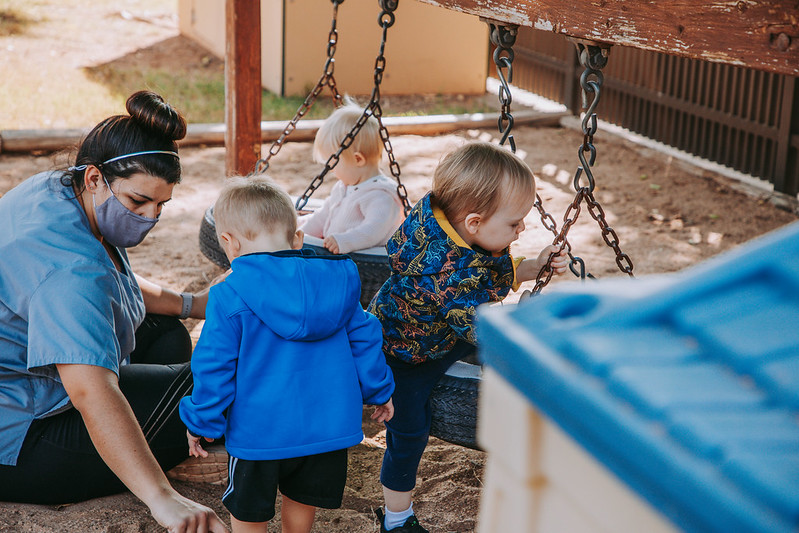
Center for Early Head Start and Child Development Research Center
Collectively, the Center for Early Head Start (CEHS) and Child Development Research Center (CDRC) at Texas Tech University serves over 200 families within the Lubbock community, but each varies in the services they provide.
While the Child Development Research Center provides educational and developmental programs for approximately 80 families with children from birth through five years of age, the Center for Early Head Start provides continuous and comprehensive child development and family support services to approximately 100 Lubbock families with children from 0-3 years.
Just as the CDRC serves as a site for instructional experiences for university students who work with children in the laboratory, student teaching, and practicum courses, CEHS offers year-round, full-day childcare, home visits to pregnant mothers and young families, hot nutritious meals, developmental and health screening, and parent education and support to qualifying families at no cost to them through federal funding from the Department of Health and Human Services.
Despite differing in services, both centers have been forced to change how they operate due to the effects of COVID-19 – yet exuding resiliency through it all.
When closures began in early March 2020 due to COVID-19, both the CDRC and CEHS had to close their doors, but still found ways to reach out to the Lubbock families they serve, with CEHS continuing to provide essential items (diapers, wipes, etc.) and basic groceries to families in need thanks to their grant funding. In addition, teachers from the centers held Zoom or FaceTime calls with their students to both keep in touch and provide an interactive reading time for the children.
Now that the Fall 2020 semester has resumed at Texas Tech, so have the Center for Early Head Start and Child Development Research Center, but with several changes in place.
Director of the Center for Early Head Start, Denise Stovall, explained that only employees of CEHS can enter the building, with parents being required to check their children in at the door and their child's temperature checked. Despite the irregularity of their return, Stovall said that children who attend CEHS have been excited to return.
Just as children of the CDRC and CEHS were affected by COVID-19, so were the TTU students in each program, with both experiencing a disruption in their regular schedules.
Currently, there are no face-to-face labs being held in either the Center for Early Head Start or Child Development Research Center. However, as CDRC director Stacy Johnson explains, they've found new ways to keep students engaged.
"Lab courses are currently being offered online without face to face interactions with children," Johnson said. "We are utilizing video footage and small group discussions with classroom teachers via Zoom and Blackboard."
In addition, there have also been opportunities created for student assistants to work within the centers and they must pass a health screening before entering.
Research within the centers, especially the Center for Early Head Start, has also continued to flourish despite the new landscape they're working within. Right now, two research projects focus on parents and their young children. Since only children can enter the center at the moment, projects are creatively going virtual, explains CEHS Executive Director, Stephanie Shine, Ph.D.
"The Wee Read literacy project engages families in reading to children; their book-reading sessions are re-configuring to be offered virtually," Shine said. "The Healthy Eating project lead by an interdisciplinary team is taking healthy eating interviews and parent peer discussions online to learn how parents are managing at mealtime and to offer support for healthy eating behaviors."
Even with the shadow of uncertainty still hanging over both the Center for Early Head Start and Child Development Research Center, Dr. Shine holds an optimistic outlook – explaining that they will be welcoming TTU lab students back in the spring, also virtually, using video footage of children in our classrooms to look at and plan environments and activities for infants and toddlers. Choosing moments to film, she says, will also help them capture and distill important features of their program, such as the ways that teachers relate with children.
"It's true that we miss the frequent face-to-face interactions of the past, but we are also looking to benefit from some of the changes," Shine said. "For example, greeting each family and child outside the building has its pleasures, it's a nice pause, a nice connection, at the beginning and end of the day."
